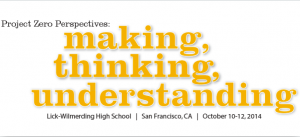 On Friday, October 10, and Sunday, October 12, my dear friend Roni Ben-David and I will instruct an interactive course at a conference in San Francisco entitled Project Zero Perspectives: Making, Thinking, Understanding. We’re thrilled for the opportunity to work together and to share the extraordinary work of our service-learners.
On Friday, October 10, and Sunday, October 12, my dear friend Roni Ben-David and I will instruct an interactive course at a conference in San Francisco entitled Project Zero Perspectives: Making, Thinking, Understanding. We’re thrilled for the opportunity to work together and to share the extraordinary work of our service-learners.
Description of course:
Service-learning is a hands-on, holistically enriching strategy for developing global competence without leaving the country. This course will explore how two institutions — the University of Southern California’s Dornsife Joint Educational Project and the Jewish Community High School of the Bay — seek to enrich service by applying theoretical and conceptual understandings as well as enrich learning by encountering diverse others’ lived realities. While the institutions differ in terms of student populations, length of engagement, and service sites, both rely upon academic preparation, community partnerships, and thoughtful reflection. Course participants will identify the synergies between service-learning and global competence, articulating how global competence skills can be practiced within service-learning contexts. Then participants will brainstorm service-learning projects for their own students, analyzing with partners if/how these projects scaffold their students’ global awareness as well as cultivate their heads, hearts, and hands.
Goals of course:
KNOWLEDGE goals: By the end of this course, participants will know…
1a. The definition and key properties of service-learning.
1b. Characteristics of globally competent students — K-12 (Boix Mansilla & Jackson, 2011), post-secondary (Russo & Osborne, n.d.).
1c. How the USC Dornsife Joint Education Project & the Jewish Community High School of the Bay facilitate service-learning experiences that cultivate global competence.
2. ATTITUDE goals: By the end of this course, participants will believe…
2a. Service-learning is a valuable strategy not only for enhancing global competence, but also for enriching theoretical knowledge, supporting social-emotional competence, honing professional skills, learning about communities, and delivering useful assistance.
2b. Global competence is an important asset for work and life, both domestically and internationally.
3. PRACTICE goals: By the end of this course, participants will be able to…
1a. Brainstorm a service-learning experience for their institutions that respects their particular philosophies/objectives, models a process of academic preparation, community partnerships, and tailored curriculum, and incorporates reflection.
1b. Identify and amplify how these service-learning proposals facilitate students’ development of global competence characteristics.
Intended audience:
Anyone interested in service-learning, high school administrators and educators (particularly grade 12), university administrators & educators (particularly sociology, community psychology, history, American Studies, urban planning, public policy, pre-service teaching), newcomers welcome!

